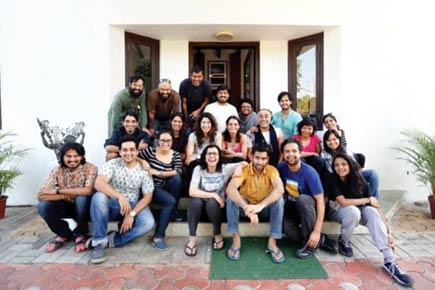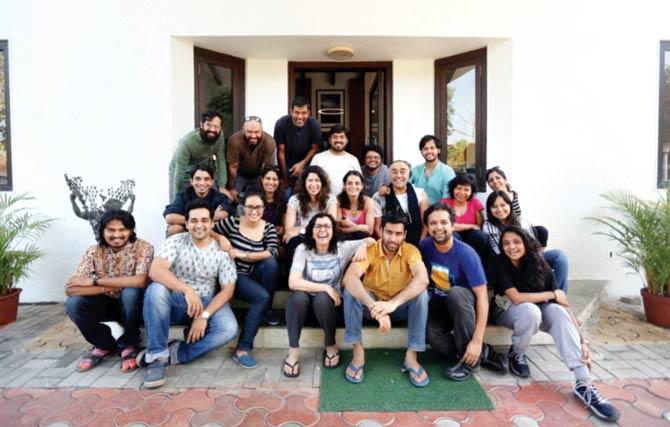More than a decade after Writers’ Bloc changed the city’s theatre scene, it continues to shine the spotlight on new voices and talent

 This evening, Writers’ Bloc 4 is to be formally launched — the fourth edition of a wonderful initiative to encourage new writing, which has had an immeasurable impact on the city’s theatre scene.
This evening, Writers’ Bloc 4 is to be formally launched — the fourth edition of a wonderful initiative to encourage new writing, which has had an immeasurable impact on the city’s theatre scene.
A decade or so ago, theatre producers and directors, adapting yet another foreign play, lamented the dearth of original playwriting in India — at least in English and Hindi. But what incentives did playwrights have? Very little money, less exposure and often writing in a vacuum with no hope of even getting their work staged. Most of them were self-taught, with hardly any chance for proper training or even mentoring. Some original English plays had emerged from the Sultan Padamsee Award for Playwriting, but that was not enough to fuel a movement, and eventually tapered off.
ADVERTISEMENT

The team at Writer’s Bloc, now in its fourth edition
Then Writers’ Bloc came along in 2003, the challenge picked up by theatre group Rage, run by Rahul da Cunha, Rajit Kapur and Shernaz Patel. According to the website, ‘Paul Smith, the inspirational head of the British Council, Mumbai, threw us a lifeline by suggesting that playwrights in India could benefit from some training. He then brought in the Royal Court Theatre, Britain’s home of new writing, to be our guide. This led to the first residential workshop at the JSW farmhouse near Nashik, where fledgling playwrights from across India worked intensely with the Court. After a second round of workshops, nine amazingly fresh, new, original scripts emerged. We knew that the playwright’s work only ends when a director gives his story vision, actors speak his words and the audience responds to his text.’
Writers’ Bloc did not just get the plays written, they matched playwrights with producers and directors, so that the works were staged, reached audiences and built reputations.
In the first edition were plays by Anupama Chandrashekhar, Aruna Thosar Dixit, Shiv Subrahmanyam, Farhad Sorabjee, Apoorva Kale, Sandesh Kulkarni, Rahee Dahake, Nitin Batra and Rahul da Cunha. The festival of these new and exciting plays — in English, Hindi and Marathi — blending fresh voices with writing finesse and the energy of young directors was a big success. Suddenly, the plays being done in the city by established groups seemed jaded and outmoded.
The best part of Writers’ Bloc was that it conquered the one-play syndrome, wherein a playwright came up with one play, thought the effort was not worth it and went on to do something more lucrative. The fact that several writers from the first lot are still active in theatre shows that the process triggered off their imagination and gave the writers an incentive to keep working and polishing their craft.
It was exciting enough to look forward to Writers’ Bloc 2. There were over a hundred entries in six different languages; 11 playwrights were selected for the training programme. In January 2007, a 24-day festival showcased their marvellously varied and stimulating work, sharing ideas that had never before been attempted on the city’s (or country’s) stages.
This time, there were writers like Irawati Karnik, Rajiv Rajendra, Ram Ganesh Kamatham, Vijay Nair, Maia Katrak, Ajay Krishnan, Manasvi Lata Ravindra, Sachin Kundalkar, Manjima Chatterjee, Anuvab Pal, Swar Thounajam —anyone who has been following the city’s theatre, would be able to see that some of them have since moved several levels higher, not just with plays but films too.
Writers’ Bloc 3 in 2011 had names like Akash Mohimen, Abhishek Majumdar, Neel Chaudhuri, Swetanshu Bora, Irawati Karnik, Shekinah Jacob, Annie Zaidi, Ayeesha Menon, Purva Naresh, Siddharth Kumar, Dharmakirti Sumant and Sagar Deskhmukh. The productions got together the cream of young directorial and acting talent and, again, some of the playwrights were destined for bigger things.
Now it’s time for Writers’ Bloc 4 and by this time, Mumbai is chock-a-block with many young playwrights, directors and actors at work, alternative venues welcoming peformances of all kinds, and the city’s stage providing talent to films, TV, ads and web series. Now theatre even seems like a viable career option for young people, who find that plays written speak their language and express their thoughts. This year, a Tamil play has found itself into the mix — Sunandha Ragunathan’s Mundhirikkotte, about the lives of three different communities crossing paths.
Asad Hussain’s (one of the writers of Bajrangi Bhaijaan) Naqqash is about a village without men; Shardul Saraf’s Janak is a satire about the system, Rahul Rai’s Outer Dilli is about the coming of age of a village boy transplanted into Delhi; Iranian born Nassim Soleimanpour’s White Rabbit Red Rabbit is about an actor performing from a script just handed to him before an audience; Saggherr Loadhii’s Tutak is about a gay man trying to be ‘normal; Swati Simha’s Flypaper Trap is about demonizing the ‘other’, Shivam Sharma’s Given is about four people coming to terms with their mistakes.
Even in troubled times like ours, writers are able to give free rein to their ideas and reflect the thoughts of today’s generation. Add to this workshops, discussions, music, and innovative ways of engaging with the audience, and the result is a festival of and for true theatre lovers.
Deepa Gahlot is an award-winning film and theatre critic and an arts administrator. She tweets at @deepagahlot
 Subscribe today by clicking the link and stay updated with the latest news!" Click here!
Subscribe today by clicking the link and stay updated with the latest news!" Click here!







